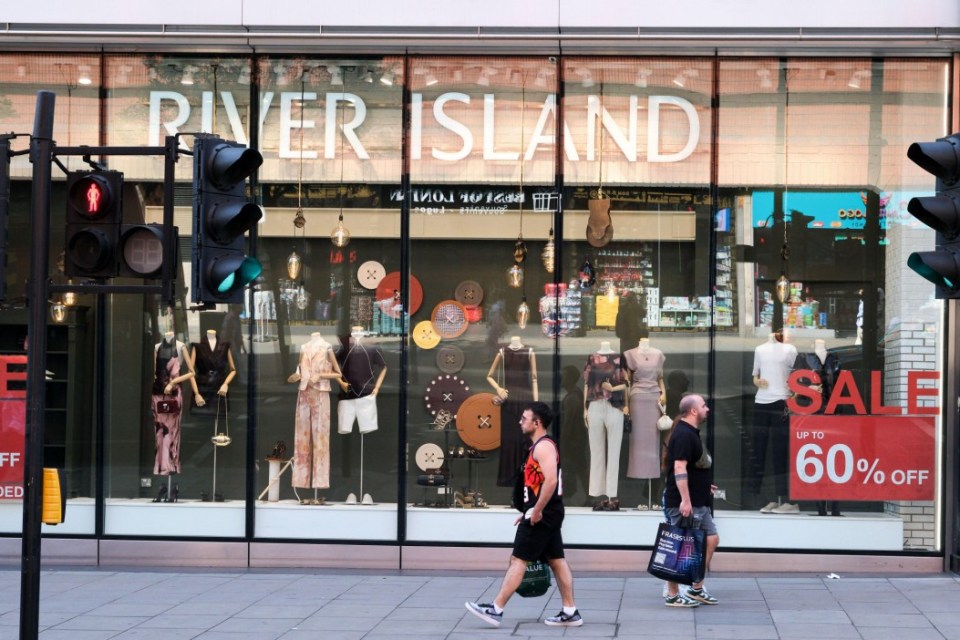RIVER Island has confirmed its first major closure in a wave of 33 shops shutting across the UK.
The retailer’s Princes Street branch in Edinburgh will shut its doors for good next month.
A notice has appeared in the window of the city-centre store telling shoppers the doors will close on Friday, September 5.
It directs customers to the retailer’s website and nearby branches at Fort Kinnaird and the Gyle.
It comes just weeks after a High Court judge approved plans for a major restructuring of the fashion chain.
The company announced earlier this year that it would axe 33 shops by January 2026, with 110 jobs set to go.
The Sun understands the Princes Street branch was always expected to close in September, while the remaining 32 stores will shut by January.
Branches earmarked for closure include sites in Beckton, Wrexham, Hereford, Didcot, Sutton Coldfield, Gloucester and Brighton, among others.
This is the full list of 33 stores that will shut:
- Beckton
- Bangor Bloomfield
- Wrexham
- Edinburgh Princes Street
- Hereford
- Surrey Quays
- Didcot
- Sutton Coldfield
- Aylesbury
- Burton-Upon-Trent
- Northwich
- Taunton
- Workington
- Falkirk
- Cumbernauld
- Kirkcaldy
- Gloucester
- Hartlepool
- Brighton
- Lisburn
- Norwich
- Oxford
- Poole
- Kilmarnock
- Hanley
- Barnstaple
- Grimsby
- Leeds Birstall Park
- Rochdale
- Great Yarmouth
- St Helens
- Stockton-on-Tees
- Perth
No major closing down sales are expected as the retailer will move leftover stock to the stores remaining open.
The major restructuring is part of a desperate bid to cut costs after River Island posted a £32.3million pre-tax loss last year and revealed turnover had slumped 15% to £578.1million.
Bosses have blamed soaring costs and the shift to online shopping for piling pressure on the business.
Alongside the 33 confirmed closures, River Island is also pleading with landlords at a further 71 stores to agree to rent reductions for three years, in some cases even dropping to zero to keep shops open.
Analysts have warned the company’s future remains fragile if landlords refuse.
The chain is owned by the billionaire Lewis family, who built the business from a small fruit and veg stall in London in 1948.
It later became Chelsea Girl in the 1970s before being relaunched as River Island in 1988, growing into a high street staple competing with the likes of Topshop and New Look.
But the retail landscape has dramatically shifted, with shoppers flocking online and costs spiralling for bricks-and-mortar stores.
River Island is the latest in a string of big names to slash its store estate, with Poundland, Hobbycraft and The Original Factory Shop all recently announcing closures.
RETAIL SECTOR STRUGGLES
The retail sector has struggled in recent years due to the onset of online shopping and lockdowns during the coronavirus pandemic.
Last month, the owners of Poundland confirmed they would shut 68 stores in a major shake-up, with 82 more at risk.
Both Hobbycraft and The Original Factory Shop are also shutting branches as part of restructuring efforts.
Higher inflation since 2022 has also hit shoppers’ budgets while businesses have struggled with higher wage, tax and energy costs.
The Centre for Retail Research has described the sector as going through a “permacrisis” since the 2008 financial crisis.
Figures from the Centre also show 34 retail companies operating multiple stores stopped trading in 2024, leading to the closure of 7,537 shops.
RETAIL PAIN IN 2025
The British Retail Consortium has predicted that the Treasury’s hike to employer NICs will cost the retail sector £2.3billion.
Research by the British Chambers of Commerce shows that more than half of companies plan to raise prices by early April.
A survey of more than 4,800 firms found that 55% expect prices to increase in the next three months, up from 39% in a similar poll conducted in the latter half of 2024.
Three-quarters of companies cited the cost of employing people as their primary financial pressure.
The Centre for Retail Research (CRR) has also warned that around 17,350 retail sites are expected to shut down this year.
It comes on the back of a tough 2024 when 13,000 shops closed their doors for good, already a 28% increase on the previous year.
Professor Joshua Bamfield, director of the CRR said: “The results for 2024 show that although the outcomes for store closures overall were not as poor as in either 2020 or 2022, they are still disconcerting, with worse set to come in 2025.”
Professor Bamfield has also warned of a bleak outlook for 2025, predicting that as many as 202,000 jobs could be lost in the sector.
“By increasing both the costs of running stores and the costs on each consumer’s household it is highly likely that we will see retail job losses eclipse the height of the pandemic in 2020.”












